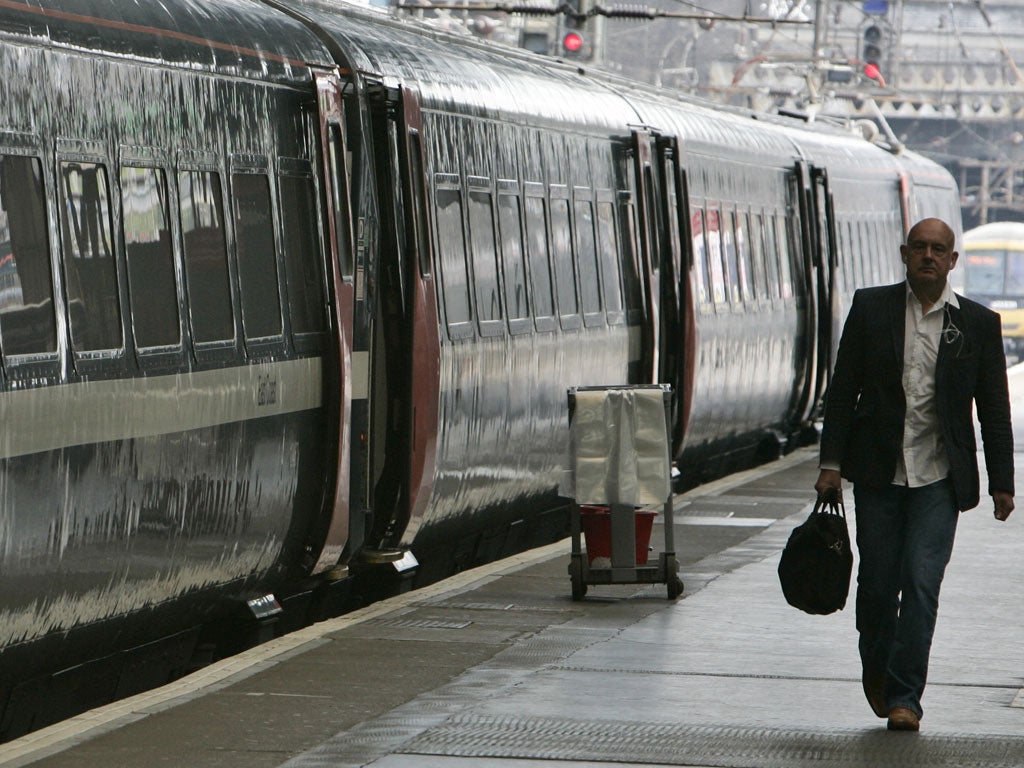Yet more strain on our trains
The Coalition's plans to help cut rail subsidies will mean many commuters pay even higher fares

Your support helps us to tell the story
From reproductive rights to climate change to Big Tech, The Independent is on the ground when the story is developing. Whether it's investigating the financials of Elon Musk's pro-Trump PAC or producing our latest documentary, 'The A Word', which shines a light on the American women fighting for reproductive rights, we know how important it is to parse out the facts from the messaging.
At such a critical moment in US history, we need reporters on the ground. Your donation allows us to keep sending journalists to speak to both sides of the story.
The Independent is trusted by Americans across the entire political spectrum. And unlike many other quality news outlets, we choose not to lock Americans out of our reporting and analysis with paywalls. We believe quality journalism should be available to everyone, paid for by those who can afford it.
Your support makes all the difference.Commuters travelling at peak times face higher fares as train operators try to tackle overcrowding on the busiest services, the Government warned yesterday as it set out moves to cut subsidies to the rail industry. Its vision of a more streamlined and modernised rail network would also mean hundreds of ticket offices at smaller stations being closed. Tickets would instead be sold at corner shops, libraries and post offices, while “smart cards” similar to London's Oyster cards would be launched to enable passengers to travel across Britain without paper tickets.
Unions protested that the plans would lead to 12,000 job losses and a poorer service, while the Labour Party claimed the proposals paved the way for a further break-up of the rail system.
The ideas were announced by the Transport Secretary, Justine Greening, in response to a report by the businessman Sir Roy McNulty, who concluded that inefficiencies on the network were costing taxpayers and fare-payers up to £3.5bn a year.
In a consultation paper, the Government suggested "using price signals to smooth demand across the commuter peak" – raising fares at the busiest times and cutting them at quieter points in the morning and evening rush-hours. It said that if passenger numbers could be spread more widely, it would delay the need for new trains to cope with demand, as well as tackling overcrowding.
In a statement to MPs, Ms Greening suggested that employers should be flexible in allowing staff staggered arrival and departure times, thus enabling them to travel on cheaper services. Plans to revamp the ticketing system to reflect that more travellers are buying tickets online, or from automated machines at stations, could lead to the closure of hundreds of booking offices.
Ms Greening said she wanted people to be able to obtain tickets from shops, libraries and post offices, just as commuters in London can use retail outlets to top up Oyster cards. Ms Greening also drew on the capital's example to suggest a nationwide "smart cards" system. She told the Commons: "It is time to bring fares out of the 1970s and into the 21st century."
However, her consultation paper admitted that "a fully smart-enabled network is still some way off", in apparent recognition of the practical problems of getting separate rail companies to work together on the initiative.
She announced that franchises would be handed to train operators for longer periods to help them to raise investment, and argued that the overhaul of the industry would mean "the days of spiralling and unjustified rail costs are coming to an end". But transport unions claimed the recommendations could cost thousands of rail jobs and lead to higher fares for some commuters.
Bob Crow, leader of the National Union of Rail, Maritime and Transport Workers (RMT), said: "This Government rail plan isn't a recipe for efficiency – it's a recipe for exploitation with the operators given the green light to rob passengers blind to travel on overcrowded and unsafe trains in the name of private profit."
He said the plans would lead to more accidents like the Potters Bar disaster in 2002, in which seven people died.
The TSSA union, representing white-collar transport workers, said plans to sell rail tickets "like lottery tickets in corner shops" would produce "rocketing fares and millions of losers".
Rail travel in numbers
1.3 billion Number of UK passenger journeys by rail per year, up from 800 million in 1987.
£7.4bn Value of the 576 million tickets sold last year.
250 million Number of journeys made in London and the South-East in the third quarter of 2011.
122 million Number of journeys made in the rest of the country during the same period.
82 per cent Ratio of tickets bought at a discount.
6 per cent Season ticket rise in January 2012. For 2013 and 2014, prices are set to rise by RPI inflation (currently 3.9 per cent) plus 3 per cent for January 2013 and January 2014.
£3.5bn Cost of inefficiency to the taxpayer, according to the McNulty review.
12,000 Number of jobs that will be lost if the McNulty recommendations are implemented, according to the RMT.
Join our commenting forum
Join thought-provoking conversations, follow other Independent readers and see their replies
Comments